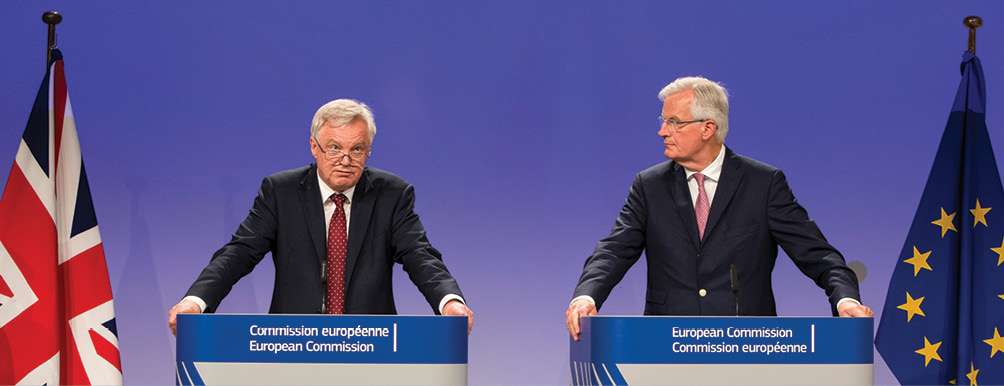Bordering on agreement


On the face of the great border debate, there appears to be very little cause for dissent. Everyone agrees, publicly at least, that there should not be a hard border on the island of Ireland. What is not agreed, however, is the suggestion that the Irish Sea might shoulder this Brexit burden. agendaNi explores a scattering of soundbites promulgated by key players.

“We don’t want to have hard borders between Northern Ireland and the Republic, we don’t want to have the Good Friday Agreement put under risk, and we want land borders to be open as possible.”
Jean-Claude Juncker, European Commission President.

“I’m a Belgian, so surrealism comes naturally to me. But to reinstate a border would be more than surreal: it would be totally absurd.”
Guy Verhofstadt, European Parliament Brexit representative.

“In particular, the Irish question is one I’m very attentive to. We must preserve the Good Friday Agreement in all its dimensions, maintain the common travel area as it is, and respect the rules of the single market. [We must] organise in one manner or another the control of people and goods which leave or enter the EU. I think it’s possible.”
Michel Barnier, European Chief Negotiator for Brexit.

“The DUP will not tolerate a border on the Irish Sea after Brexit that makes it more difficult to live, work and travel between different parts of the United Kingdom.”
Nigel Dodds, DUP deputy leader.

“Both the DUP and the UK government acknowledge that delivering a relatively frictionless border will not be easy but we believe there are technological solutions that can help achieve this. We have made clear many times that we want a soft border.”
Jeffrey Donaldson, DUP MP.

“During the referendum campaign and since, some of those who were on the ‘remain’ side of the argument have argued that the UK’s departure from the EU will result in a hard border on the island of Ireland, but I know of no one who wishes that to be the case. The fact that, geographically, Northern Ireland is the only part of the UK which will have a land border with the EU does make us different, as does our history and our politics.”
Arlene Foster, DUP leader.

“Any restriction on the freedom of movement would represent a hardening of the border. This would severely damage social and economic cohesion. It would be unacceptable to people living in border communities and to people right across the island. Special status would ensure the North’s trading relationship with the rest of Ireland and the EU will be maintained.”
Gerry Adams, Sinn Féin President.

“A hard Brexit would be disastrous for Ireland and would cause serious damage to our strong relationship with Britain. It is also in Ireland’s interest to see the UK and Northern Ireland remain in the customs union in order to prevent the imposition of border controls on the island of Ireland.”
Micheál Martin, Fianna Fáil leader.

“The Government is determined to avoid a hard border on the island of Ireland and to maintain, to the greatest extent possible, the status quo.”
Simon Coveney, Irish Minister for Foreign Affairs.

“As far as this Government is concerned, there shouldn’t be an economic border. We don’t want one. It’s Britain that has decided to leave and if they want to put forward smart solutions, technological solutions for borders of the future then that is up to them.”
Taoiseach Leo Varadkar.

“We had a common travel area between the UK and the Republic of Ireland many years before either country was a member of the European Union. We are clear we do not want a hard border – no return to the past – and no unnecessary barriers to trade. What we will do is deliver a practical solution that will work in everyone’s interests.”
David Davis, British Secretary of State for Exiting the European Union.

“We and the EU have committed to protecting the Belfast Agreement and the Common Travel Area. We have both stated explicitly that we will not accept any physical infrastructure at the border. We owe it to the people of Northern Ireland and to everyone on the island of Ireland to see through these commitments.”
Theresa May, British Prime Minister.





